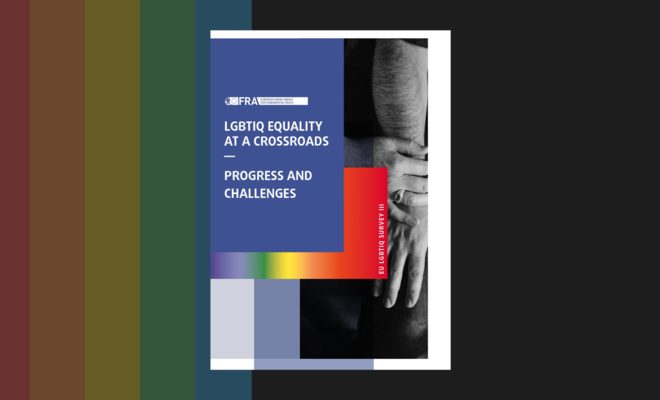LGBTIQ equality at a crossroads: progress and challenges

More LGBTIQ people in Europe are now open about who they are. At the same time, they face more violence, harassment, and bullying than before. This is especially true for younger LGBTIQ people, who are particularly vulnerable. These are some of the findings of the latest EU Agency for Fundamental Rights (FRA) survey, based on responses from more than 100,000 LGBTIQ people across Europe.
The report ‘LGBTIQ equality at a crossroads: progress and challenges’ captures the experiences, views and challenges LGBTIQ people face in Europe. It also highlights the changes since FRA’s previous surveys in 2019 and 2012.
The findings reveal signs of slow but gradual progress. While discrimination against LGBTIQ people remains high, it is gradually declining. Schools deal with LGBTIQ issues more positively and proactively, and young people feel more supported by their teachers and peers. Nevertheless, bullying, harassment and violence have reached high levels.
The key findings of the survey include:
- Openness: over 1 in 2 are now open about their sexual orientation, gender identity and expression, and sex characteristics. But most still avoid holding hands with their same-sex partner in public for fear of being attacked.
- Discrimination: over 1 in 3 face discrimination daily because of who they are. This is a slight decrease from 2 to 5 in 2019. Yet, discrimination remains invisible as only 1 in 10 report incidents.
- Violence: over 1 in 10 experienced violence in the 5 years before the survey, slightly more than in 2019. Over 1 in 3 intersex people were attacked.
- Harassment: over 1 in 2 were victims of hate-motivated harassment, up from 1 in 3 in 2019. 2 in 3 intersex and trans people were harassed.
- Bullying: over 2 in 3 say they were bullied at school, across all generations and in all EU countries. This is a steep increase compared to 1 in 2 in 2019.
- Education: schools address LGBTIQ issues more often than before. Over 1 in 5 LGBTIQ pupils now say that their school addressed the issue positively.
- Mental health: over 1 in 3 have contemplated suicide. Over half of trans, non-binary and gender diverse people say they have suicidal thoughts.
- ‘Conversion’ practices: 1 in 4 say they were forced to go through conversion practices to change their sexual orientation or gender identity and expression.
- Governments: Only 1 in 4 consider that their governments are combatting prejudice and intolerance against LGBTIQ people, compared to 1 in 3 in 2019.
The report also highlights that the experiences of LGBTIQ people vary significantly across the EU and every group faces different challenges.
Intersex, trans, non-binary and gender-diverse people face more harassment and violence. They are more likely to face mental health issues and have suicidal thoughts. They are also more likely to experience homelessness and struggle to access medical care. This is also true for LGBTIQ people with disabilities, in financial hardship or members of ethnic, racial or other minority groups.
The survey findings will support the European Commission to evaluate its LGBTIQ Equality Strategy and help advance policies to protect and promote the fundamental rights of LGBTIQ people. FRA calls on governments to take action:
- Hate crime: enforce a culture of zero tolerance towards violence and harassment of LGBTIQ people. Invest in police training to ensure they recognise, record and properly investigate LGBTIQ hate crime so that victims feel safe to report attacks and are treated fairly. Consider bias motivations as aggravating factors during criminal proceedings.
- Discrimination: tackle discrimination in all areas by adopting the EU’s Equal Treatment Directive and the Equality Body Standards Directives. Empower and properly resource equality bodies so they can better support victims.
- Online hate: tackle online hatred and disinformation campaigns against LGBTIQ people. Address the risk of bias in algorithms and the accountability of digital platforms under EU law.
- Education: make schools safe and supportive learning environments for all children. Tackle bullying and ensure that educational curricula and systems build on best practices promoted by the EU.
- Healthcare: secure access to quality healthcare, including mental health support. End ‘conversion’ practices and non-vital medical interventions.
FRA Director Sirpa Rautio: “Being openly LGBTIQ in Europe should not be a struggle. Even though we see signs of progress, bullying, harassment and violence remain constant threats. It is time to act decisively and build on our progress, so everyone in the EU is treated equally and can live with dignity and respect.”
Commissioner for Equality Helena Dalli: “FRA’s survey findings provide invaluable data on the lived experiences of LGBTIQ people across Europe. They help us identify the progress we have achieved and highlight the challenges that still lie ahead. I encourage all Member States to use the data to deliver robust policies to counter discrimination and protect the rights of all LGBTIQ people.”
This survey draws on findings from over 100,000 respondents from all 27 EU countries, Albania, the Republic of North Macedonia and Serbia.
FRA will present the report at the ‘Pride Alliances and Policy’ event organised by the Belgian presidency of the Council of the EU in Brussels on 17 May.
Centre for Peace Studies is part of the multidisciplinary research network FRANET of the EU Agency for Fundamental Rights together with organisations BaBe - Be Active. Be Emancipated. and Human Rights House Zagreb since 2014.



